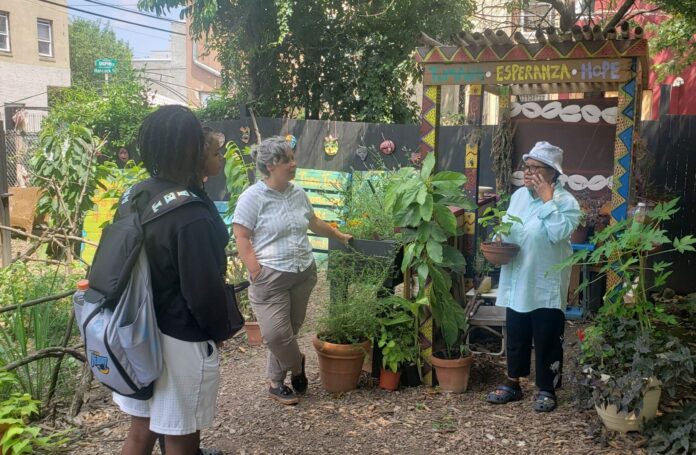Author: Sha’Mir Ravenell & Abdalee De Castro
Our summer interns Sha’mir (Mir) Ravenell and Abdalee (Abby) De Castro reflect on their time supporting our community work in the Pasa Philly hub office and visiting farms around the city. This internship opportunity was coordinated through the Philadelphia Higher Education Network for Neighborhood Development (PHENND).
Being members of the Pasa team for the past six weeks has been an incredible experience as two individuals wanting to learn more about their community. We’ve both learned about what goes on in farms besides just growing fresh food.
Land & spirituality
Sankofa Community Farm at Bartrams Garden was more than just a farm. More than just growing foods. They are cultured around the African Diaspora.
Sankofa is a very spiritual place.
Before walking in we did a land blessing to pay gratitude to the land and ancestral diaspora.
We had to have a reason, a good purpose of walking onto the farm.
“My purpose was to understand more about Sankofa and to get more spiritually connected to myself. When I walked in there I felt a different aura. It felt peaceful and safe in the garden.” — Mir
The staff members there were also very respectful.
They informed us about how heritage became involved with the growing practices.
We saw them prepping meals for lunch and cleaning the foods and tying them up together for the farm markets they do.
Culture & history
Norris Square Neighborhood Project is based on Puerto Rican and African culture. People in the community feel more connected to the farm because it’s their heritage and it’s their lifestyle.
Iris Brown educated us on the garden’s history and her own ancestry and culture.
The Villa Africana Colobó garden at Norris Square Neighborhood Project.
Many of the greens and herbs they grow there are from Africa or Puerto Rico.
Management & organization
When we visited Novick Urban Farm we learned that even though their space was small, they had two farms. They had a community garden and another garden to grow food to sell.
Clara gave us a tour. She showed us the pros and cons of being a farmer.
She walked us throughout the greenhouse and explained how they use it to grow.
Clara also showed us the chickens. They were so soft and kinda fragile.
Organizing farms is very important. It’s important that you know which plants are which and that they are labeled. In order to have healthy and good growing food you need to have them separated and organized. You can’t have two plants that don’t benefit from each other growing side by side.
One of the main things we learned is that when certain crops don’t grow right, you have to learn from your mistakes and improve on them the next time. Learn from your losses.
Education & cooperation
In order for farms to manage farmers have to work together as a team. They have to communicate and trust each other in order to maintain a good team relationship. Our experience from going to farms like Truelove Seeds and seeing teams of farmers working together was amazing. They are respectful and take pride in growing the plants at their farm. They respect each other and are good at explaining and learning from one another.
Wrapping corn to protect it from birds at Truelove Seeds.
Learning how to save tomato seeds.
Many of the farms we visited had youth involvement. Showing the youth how to manage farms and how to grow food is very important. It’s also better for communities to have the young ones working and being productive at farms. Training them and teaching them how to manage a garden or farm will be good for the future. It’s also making the younger generation more aware of the farm’s mission. The more the youth is educated about this the more help to the cause.
Sankofa Farm Co-Director and Pasa board member Ty Holmberg and the Sankofa team at Philly Youth Growers Market
Community & policy
Learning about the experiences of others working at different farms felt amazing. We also got to work on a mapping project locating Pasa member farms in Pennsylvania on a map both digitally and on a paper map in the Philly office.
Meeting the Pennsylvania Secretary of Agriculture and learning about the farming system as a whole was such a privilege to have had while working here.
Pennsylvania Secretary of Agriculture Russell Redding visited the Pasa Philly office during PA Urban Ag Week.
We got a chance to talk with him during lunch.
Abby asked Secretary Redding, “How far are you willing to go to help farms in our community?”
We will be sure to take everything that we’ve learned and incorporate it all into our future as much as possible!
This internship opportunity was coordinated through the Philadelphia Higher Education Network for Neighborhood Development.
